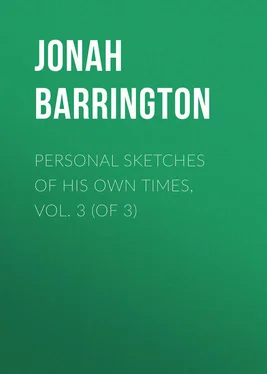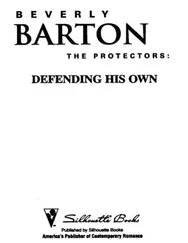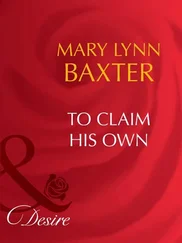Jonah Barrington - Personal Sketches of His Own Times, Vol. 3 (of 3)
Здесь есть возможность читать онлайн «Jonah Barrington - Personal Sketches of His Own Times, Vol. 3 (of 3)» — ознакомительный отрывок электронной книги совершенно бесплатно, а после прочтения отрывка купить полную версию. В некоторых случаях можно слушать аудио, скачать через торрент в формате fb2 и присутствует краткое содержание. Жанр: foreign_antique, foreign_prose, на английском языке. Описание произведения, (предисловие) а так же отзывы посетителей доступны на портале библиотеки ЛибКат.
- Название:Personal Sketches of His Own Times, Vol. 3 (of 3)
- Автор:
- Жанр:
- Год:неизвестен
- ISBN:нет данных
- Рейтинг книги:4 / 5. Голосов: 1
-
Избранное:Добавить в избранное
- Отзывы:
-
Ваша оценка:
- 80
- 1
- 2
- 3
- 4
- 5
Personal Sketches of His Own Times, Vol. 3 (of 3): краткое содержание, описание и аннотация
Предлагаем к чтению аннотацию, описание, краткое содержание или предисловие (зависит от того, что написал сам автор книги «Personal Sketches of His Own Times, Vol. 3 (of 3)»). Если вы не нашли необходимую информацию о книге — напишите в комментариях, мы постараемся отыскать её.
Personal Sketches of His Own Times, Vol. 3 (of 3) — читать онлайн ознакомительный отрывок
Ниже представлен текст книги, разбитый по страницам. Система сохранения места последней прочитанной страницы, позволяет с удобством читать онлайн бесплатно книгу «Personal Sketches of His Own Times, Vol. 3 (of 3)», без необходимости каждый раз заново искать на чём Вы остановились. Поставьте закладку, и сможете в любой момент перейти на страницу, на которой закончили чтение.
Интервал:
Закладка:
One observation, however, I may venture, and (though singular) I have very generally found it a true one, namely, that the best writers are the most thin-skinned, and become jealous of comment, pari passu with the march of their celebrity. Even when their literary reputation has been popularly established beyond the power of “reviewing” injury, they feel more ticklish at criticism than scribblers in the fifth degree of comparison; and, as if they were afflicted with the disease called “noli me tangere,” they consider even the approach of a quill as injurious to their tranquillity. Such species of impression on either a party or a partizan has no doubt procured me the honour of the letter I have alluded to; – it is palpably the work of no ordinary penman. I regret that I must persist in my opinion both as to the lady and gentleman, and cannot relinquish my consistency as to the principle of distinction between genius and talent, though with modification, and perhaps according to my more minute view of these modern rarities.
I never found these gifts of intellect completely amalgamated in any one modern writer either in prose or poetry. Heavens and earth – flights of fancy, and matters of fact, savans and rainbows, angels, and ladies of quality, &c. &c. &c. afford very different touchstones whereby to assay the extent of human intellect.
The personages that Z. Y. has alluded to may rest assured that not a friend of theirs, either old or new, has a greater pride in their compatriotship than the composer of this terrestrial bagatelle; the one works in prose, and dresses in poetry, the other makes Irish petticoats with foreign flounces to them. Both are good artists – yet I confess myself so very worldly and unrefined a being that I should, under the circumstances of Ireland, prefer one sound, unexaggerated, unagitating true matter-of- fact essay on the real condition of my countrymen. The most lovely subjects of madrigal and sonnet, after a curt exhibition of their charms, wax old and ugly, and in some time enjoy little more than a florid epitaph. Time with his extinguisher soon puts out all flames of an amatory description, and reduces both the poet and his muse – the first (if he lives) to a state of dotage, the other to the enjoyment of some “newer lover.” But the love of a country blooms for ever: it defies the power of time and the lapse of ages; and I should like to see the produce of some proud and emulative talent or genius, to decide which is best adapted to descant upon that subject. Two attempts on that matter I have seen; the one has lost reputation by danger – diving too deep; the other gained none by being too superficial. Of all themes, absenteeism , if handled strongly, would give great credit, if its writer would take a fair, clear, and comprehensive view of that existing cause of national misfortune.
CONTENTS
OF
THE THIRD VOLUME.

PERSONAL SKETCHES.
PERPLEXITIES OF A BARONET
The Author apologises for ending, instead of commencing, his former volumes, with an inquiry into his pedigree – How to improve a family name – The cognomen of Alderman Sir W. Stammer – Vowel versus Consonant – The lady of “masculine understanding” – The Alderman’s conditions on altering his surname – Unsuspected presidency of King James at the Dublin municipal meetings – Ulster king-at-arms – George the Fourth’s visit to Dublin – Various heraldic bearings.
The concluding the second volume of my Biographical Sketches with the recital of a laborious search after my progenitors, doubtless savours somewhat of our national perversions. But those who know the way in which things are done in Ireland, will only call it a “doughan dourish,” or “parting drop” – which was usually administered when a man was not very sure which end of him was uppermost.
The English, in general, though not very exquisite philologists, and denominated “Bulls” in every known part of the world, have yet a great aversion to be considered “ blunderers ;” an honour which their own misprisions of speech fall short of, owing to the absence of point in their humour (as they call it).
When an English dramatist wants a good blunder , he must send to Ireland for it. A few English blunders would damn the best play; and I have known some pieces actually saved by a profusion of Irish ones. As to my misplacing my pedigree, I can only say, that though an English writer, speaking of his origin, would say he was born and bred at London, &c. &c. – an Irishman always places his acquirements before his birth, and says he was bred and born at Drogheda, &c. My mistake is not quite so bad as this; and I shall endeavour to recompense my readers for having made it, by transporting them to the city of Dublin, where, so long as a thing has fun in it , we set all cold-blooded critico-cynicals at defiance, and where we never have a lack of families and of good pedigrees – at least for home consumption.
The sketch which I thus introduce has certainly nothing whatever in it connected with myself. However, it is so far in point, that it proves how very differently gentlemen may furbish up families; – one by traversing foreign parts to discover the old cavaliers, arms, and quarterings of his race; – another by garnishing a new coach with new quarters, shields, and bearings, such as no family, ancient or modern, had ever seen or heard of till they appeared emblazoning the pannels of an alderman’s landau.
In the year of our Lord 1809, after his late Majesty King George the Third had expended forty-nine years of his life in ruling the state, it pleased his royal fancy to order a universal jubilee, and to elevate his Lord Mayors into Imperial Baronets. At this propitious era, William Stammer, Esquire, Alderman of Dublin, and likewise of Skinners’ Alley, wine-merchant, do. consumer, dealer and chapman, freemason, orangeman, and friendly brother, happened, by Divine Providence and the good-will of the Common Council, to be seated on the civic throne as “the Right Honourable the Lord Mayor of the King’s good city of Dublin.” He ruled with convivial sway the ancient, loyal, joyous, moist, and vociferous municipal corps of the said celebrated city, and its twenty-four federated corporations: – consequently he was, in point of dignity, the second Lord Mayor in all Christendom , though unfortunately born a few centuries too late to be one of its seven champions . However, being thus enthroned at that happy festival time, he became greater than any of these, and found himself, suddenly, as if by magic, (though it was only by patent,) metamorphosed into Sir William Stammer, Baronet of the United Kingdoms of England, Scotland, and Ireland.
Sir William Stammer, Bart., being (as he himself often informed me, and which I believe to be true,) an excellent, good-hearted kind of person, and having by nature an even, smooth-trotting temper, with plenty of peace and quietness in it, bore his rank with laudable moderation: but as he was the first genuine corporator the Union had honoured by this imperial dignity, he felt a sort of loyal fervor, which urged him to make some particular acknowledgment to his gracious Majesty for so unprecedented a mark of distinction. But in what way a sober British king should be complimented by an Irish wine-merchant was a matter which required much ingenuity and profound consideration. At length, it was suggested and strongly urged by several of his civic friends, (especially those of the feminine gender,) that his Lordship had it actually within his power to pay as loyal and handsome a compliment as ever was paid to any king of England by an Irish gentleman with a twang to his surname; videlicet , by sacrificing the old Irish pronunciation thereof, ameliorating the sound, and changing it in such sort, that it might be adapted to the court language, and uttered without any difficulty or grimace by the prettiest mouths of the highest classes of British society; it was, in fact, strenuously argued that, instead of the old hacknied family name commonly pronounced Stam-mer, the word Steem-er (being better vowelled and Anglicised) would sound far more genteel and modern, and ring more gratefully in the ear of royalty. It was also urged, how Mrs. Clarke’s friend, the Rev. Dr. O’Meara, unfortunately lost the honour of preaching before royalty by his pertinacity in retaining the abominable O , and that had he dropped that hideous prefixture, and been announced plainly as the Rev. Doctor Meera, his doctrines might probably have atoned for his Milesianality, and a stall in some cathedral, or at least a rural deanery, might have rewarded his powers of declamation.
Читать дальшеИнтервал:
Закладка:
Похожие книги на «Personal Sketches of His Own Times, Vol. 3 (of 3)»
Представляем Вашему вниманию похожие книги на «Personal Sketches of His Own Times, Vol. 3 (of 3)» списком для выбора. Мы отобрали схожую по названию и смыслу литературу в надежде предоставить читателям больше вариантов отыскать новые, интересные, ещё непрочитанные произведения.
Обсуждение, отзывы о книге «Personal Sketches of His Own Times, Vol. 3 (of 3)» и просто собственные мнения читателей. Оставьте ваши комментарии, напишите, что Вы думаете о произведении, его смысле или главных героях. Укажите что конкретно понравилось, а что нет, и почему Вы так считаете.












